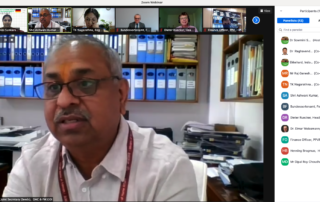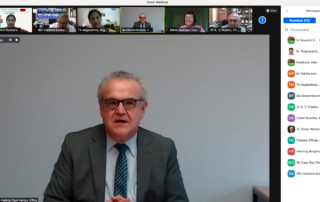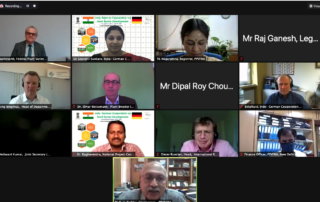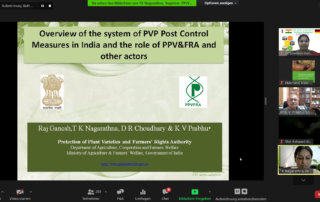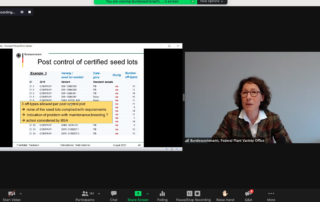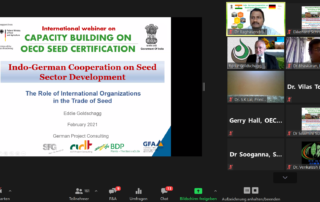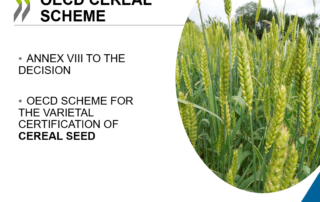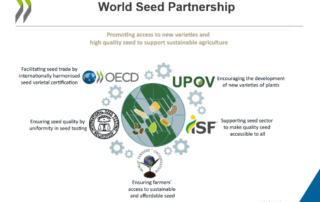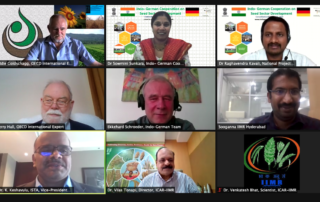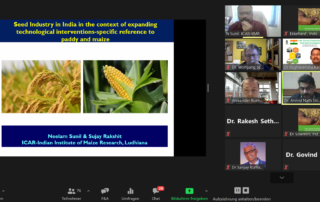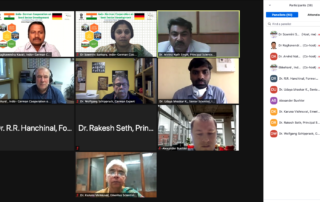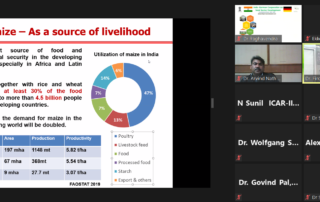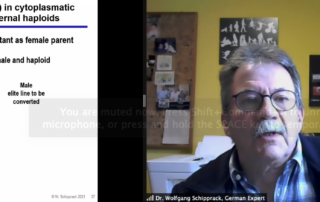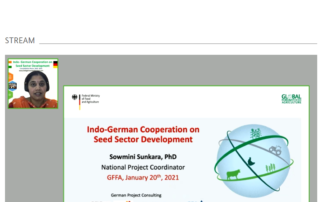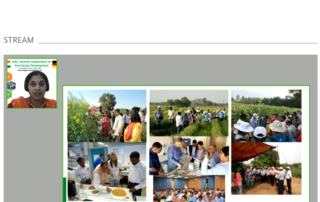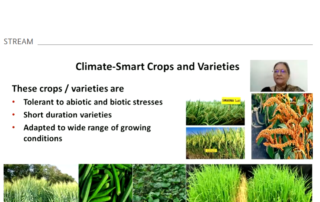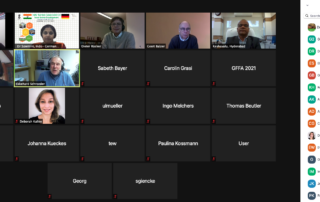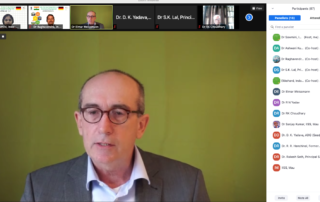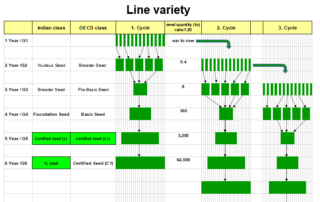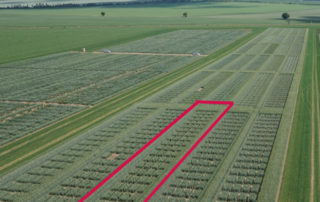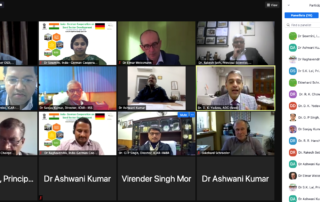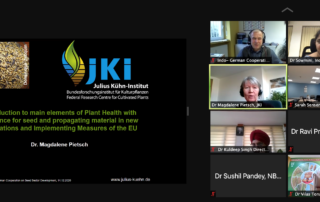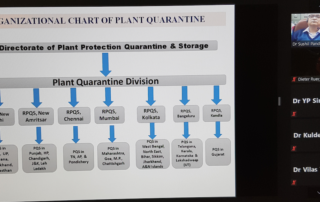News Archive
International Webinar on Post PVP Control Measures
The international webinar on verification of the maintenance of protected varieties (Post PVP Control Measures) was successfully conducted on April 8th, 2021 in cooperation with the Department of Agriculture & Cooperation and Farmers Welfare (DAC&FW), Ministry of Agriculture and Farmers Welfare, GOI, the Protection of Plant Varieties and Farmers Rights Authority (PPVFRA), New Delhi, the Federal Plant Variety Office of Germany (BSA) and the German Plant Breeders’ Association (BDP) in the frame of the Indo-German Co-operation Project on Seed Sector Development. The aim of this webinar was to exchange experiences & views between experts of India and Germany on various aspects involved in post Plant Variety Protection (PVP) Control Measures.
PVP involves the protection of breeders’ rights granted by the competent Authority. After granting PVP it is very crucial to ensure that the protected variety remains uniform and stable. Therefore, the breeder must carry out systematic maintenance breeding. In addition, competent Authorities are obliged to control & verify that the seed lots of a protected plant variety fulfils continuous the necessary requirements in accordance with the variety description.
More than 200 Officials from Seed Department of DAC&FW, MOA, GOI, Staff of PPV&FRA, Officials of DUS centres and Officials of State Department of Agriculture, National Seed Corporation, State Seed Corporation, Private Seed Industry associations (NSAI & FSII), ICAR institutes, SAU’s etc. have participated at the webinar.
The webinar was opened with welcome remarks of:
- Shri Ashwani Kumar, Joint Secretary (Seeds), DAC&FW, GOI;
- Dr K. Vinod Prabhu, Chairperson, PPV&FRA, New Delhi; and
- Elmar Pfuelb, President of Federal Plant Variety Office of Germany (BSA).
The following topics have been covered:
- Overview of the system of PVP Post Control Measures in India and the role of PPV&FRA and other actors (Dr T. K. Nagarathna, Registrar at PPV&FRA);
- Overview of the system of PVP Post Control Measures in Germany/EU and the role of BSA and other actors (Friedhilde Trautwein, BSA);
- Activities of BSA to combine reference collection, similar varieties in DUS testing, post control of seed lots and PVP post control activities (Friedhilde Trautwein, BSA);
- Duties of public designated regional Authorities responsible for seed certification, market control, seed quality testing etc. on post control of certified seed in collaboration with BSA in Germany (Henning Brogmus, Head of Seed Certification & Seed Market Control at Designated Authority of German State Schleswig-Holstein);
- Responsibilities of the PVP owner after PVP grant and registration to the National List (Dr Elmar Weissmann, plant breeder in Germany);
- Enforcement of Plant Breeders’ Rights in Germany (Dieter Ruecker, BDP).
In addition, Mr Ekkehard Schroeder (German Team Leader), Dr Sowmini Sunkara & Dr Raghavendra Kavali (National Project Coordinators, Indo- German Cooperation on Seed sector project) also participated and supported the organization of the webinar.
The project is part of the bilateral cooperation programme of the German Ministry of Food and Agriculture (BMEL) and implemented by the consortium of ADT Project Consulting GmbH (ADT) and German Plant Breeders’ Association (BDP).
International Webinar on OECD Seed Certification Successfully Conducted
In the frame of the project “Indo-German Cooperation on Seed Sector Development”, a five-day webinar on OECD Seed Certification was successfully conducted between February 08th – 12th, 2021 in cooperation with DAC&FW, Ministry of Agriculture and Farmers Welfare, Govt. of India and the Indian Council of Agriculture (ICAR) – Indian Agricultural Research Institute (IARI), New Delhi and Indian Institute of Millet Research (IIMR), Hyderabad. During this capacity building program, the most important seed crops of the Northern Zone (Wheat, Barley & Mustard) and Southern Zone (Maize, Sorghum & Pearl Millet) were selected for the crop specific training part.
The OECD Seed Schemes provide an international framework for the certification of agriculture seed moving in international trade. The OECD Seed Scheme prescribes a set of procedures, methods and techniques for monitoring quality seed supply which assures for maintenance and safeguarding of the varietal identity as well as purity. It provides legal framework for the certification of the crop seeds moving in International trade(www.oecd.org/agriculture/seeds).
India is intending to boost its seed export to other countries of the world. Therefore, capacity building on OECD Seed Certification is important concern of the Government of India and the Indian seed industry. The implementation of international standards on seed certification can help also to improve seed quality in general in India.
The aim of the webinar was to exchange knowledge, experiences & views between experts of India and International OECD experts on various topics related to the OECD Seed Certification Schemes. More than 165 Officials from Seed Department of DAC & FW, MoA, GoI, Officials of State Department of Agriculture, National Seed Corporation, State Seed Corporation, Private Seed Industry associations (NSAI & FSII), ICAR institutes, SAU’s, OECD Designated Authorities and Seed Certification agencies etc. of both the Northern & Southern Zones have attended this webinar.
A team of well experienced national and international experts/trainers from public and private sector covered various topics during this webinar which include:
- Overview of national and OECD seed certification systems;
- Status of Implementation of National & OECD Seed Certification Systems in India;
- The Role of International Organisations like ISF, IPPC, UPOV, ISTA, OECD in the Global Seed Trade;
- OECD Seed Schemes Rules and Regulations: Part I & Part II;
- Eligibility criteria and acceptance of varieties – DUS & VCU testing procedures in the context of OECD Seed Certification;
- Overview on Seed Sampling;
- Authorization of Inspectors, samplers & seed testing laboratories;
- Rules and Guidelines for Multiplication Abroad, Post-Control general, Planning and management of control plots, listing of varieties and or hybrids;
- The OECD Scheme for Cereal Seed, Maize, Sorghum Pearlmillet Seed, Crucifer and Other Oil or Fibre Species;
- Registration of seed production fields, general crop and field requirements,
- Field Inspections, inspection reports & Varietal Descriptors –Sorghum, Pearlmillet, Maize, Wheat, Barley & Mustard;
- Labelling 1 – Colour coding, examples of OECD Labels, required information on labels and OECD Varietal Certificates;
- Labelling 2 – Supply of Certification Label & Seed Certification Labelling systems in India vs OECD Seed Schemes.
As international OECD Experts Eddie Goldschagg from South Africa and Gerry Hall from UK had been key trainers. All speakers from India and abroad provided excellent presentations and information on the topics above. Many other participants actively participated and contributed to fruitful discussions during Q & A Sessions on all the five days.
International Webinar on Seed Production with Focus on Maize and Paddy
In the frame of the project “Indo-German Cooperation on Seed Sector Development“ an extensive capacity building programme in 5 technical areas will be implemented in 2021 & 2022 in 3 agro-climatic zones (Northern, Eastern and Southern Zones of India):
- Capacity Building on Seed Production;
- Capacity Building on Post-harvest Technologies for Better Seed Quality;
- Capacity Building on Seed Quality Enhancement;
- Capacity Building on Seed Testing According ISTA Standards;
- Capacity Building on OECD Seed Certification.
From February 03rd – 05th, 2021 the second International Webinar “Capacity Building on Seed Production” in the Eastern Zone was successfully conducted this year in cooperation with DAC&FW, Ministry of Agriculture and Farmers Welfare, Govt. of India and the Indian Council of Agriculture (ICAR) – Indian Institute of Seed Science (IISS), Mau. During this capacity building program, the most important seed crops of Eastern zone were selected i.e., Maize & Paddy.
More than 65 Officials from Seed Department of DAC&FW, MoA, GoI, Officials of State Department of Agriculture, National Seed Corporation, State Seed Corporation, Private Seed Industry associations (NSAI & FSII), ICAR institutes, SAU’s etc. have attended this webinar & participated in active discussions.
A team of well experienced national and international experts/trainers from public and private sector covered various topics during this webinar which include:
- Indian Seed Industry: An Overview on Maize & Paddy Segmentation;
- Maintenance Breeding & Breeder Seed Production: SOPs in Paddy (OPVs & Hybrids);
- Maintenance Breeding & Breeder Seed Production: SOPs in Maize (OPVs & Hybrids);
- Latest Trends & Technologies in Maize Seed Production;
- Indian Seed Industry: Current Trends and Future Outlook;
- Foundation & Certified Seed Production: SOPs in Paddy (OPVs);
- Foundation & Certified Seed Production in Paddy Hybrids;
- Foundation & Certified Seed Production in Maize Hybrids;
- General Principles of Quality Seed Production;
- Seed Production and Supply System in India: Opportunities and Challenges;
- Recent Advances in Storage Seed Insects Pests Management;
- Detection and Management of Seed Borne Pathogens in Paddy & Maize;
- Seed Quality Enhancement in Paddy & Maize.
All speakers from India and Germany provided excellent presentations and information on the topics above. Many other participants actively participated and contributed to fruitful discussions during Q & A Sessions on the three days.
The project is part of the bilateral cooperation programme of the German Ministry of Food and Agriculture (BMEL) and implemented on the German side by the consortium of ADT Project Consulting GmbH (ADT) and German Plant Breeders’ Association (BDP).
The role of the seed sector in strengthening the resilience of agricultural production
The Global Forum for Food and Agriculture (GFFA) is an international conference on agri-food policy issues which takes place usually in Berlin, Germany. Due to the Corona restrictions the conference took place this year only virtually from January 18th to 22nd, 2021. By choosing “How to Feed the World in Times of Pandemics and Climate Change” as the topic for this year’s event, the GFFA 2021 addresses two particularly important challenges to global food supply which require global cooperation https://www.gffa-berlin.de/en/ .
On January 20th, 2021, a panel discussion on the role of the seed sector in strengthening the resilience of agricultural production took place in the frame of the GFFA. This panel discussion was organized by the GFA Consulting Group and the German Agency for International Cooperation (GIZ). As part of a virtual expert panel discussion with representatives from science and agribusiness, concrete experiences from the projects of the Bilateral Cooperation Programme (BKP) of the BMEL in India and Ethiopia have been presented and discussed.
After the introduction to the topic of the event, the National Project Coordinator Dr Sowmini Sunkara gave short overview about the ongoing Indo-German Cooperation Project on Seed Sector Development, emphasising the objectives, approaches and the evolution of the project as well as key partners in India and Germany involved. Along with this presentation, a short video clip was also presented by the Indo-German project describing briefly the impact of climate change on agriculture production in India and the role of the seed sector in strengthening the resilience of agricultural production. This was completed by a short introduction on the Indian experience and challenges in this context by Dr Malavika Dadlani, who is the President of the Indian Society of Seed Technology and regular active as Senior Short-term Seed Sector Expert of the Indo-German seed project.
The details of the panel is available Online @ https://www.gffa-berlin.de/en/fachveranstaltungen-2021/fachpodien/fachpodium-8/
Panel discussion is available online @https://youtu.be/K6ZZZr5gPAA
International Webinar on “Capacity Building on Seed Production – Northern Zone”
The project “Indo-German Cooperation on Seed Sector Development” is part of the bilateral cooperation programme of the German Ministry of Food and Agriculture (BMEL) and implemented by the consortium of ADT Project Consulting GmbH (ADT) and German Plant Breeders’ Association (BDP). The objective of this bilateral cooperation project is to strengthen the Indian seed sector and to facilitate the cooperation of Indian and German institutions in the seed sector.
In accordance to the regional priorities of seed production, an International Webinar on “Capacity Building on Seed Production – Northern Zone” was successfully conducted between January 12th – 14th, 2021 in cooperation with DAC&FW, Ministry of Agriculture and Farmers Welfare, Govt. of India & Indian Council of Agriculture (ICAR)- Indian Agricultural Research Institute Regional Station, Karnal, Haryana, India. During this capacity building program, the most important seed crops of Northern zone were selected i.e., Mustard, Wheat & Barley.
The aim of this webinar was to exchange experiences & views between experts of India and Germany on various aspects involved in seed production. More than 80 Officials from Seed Department of DAC & FW, MOA, GOI, Officials of State Department of Agriculture, National Seed Corporation, State Seed Corporation, Private Seed Industry associations (NSAI & FSII), ICAR institutes, SAU’s etc. have attended this webinar & participated in active discussions.
A team of well experienced national and international trainers from public and private sector covered various topics during this webinar which include:
- Indian seed industry: Current trends and future perspectives;
- Overview in Seed Production System in Germany/ EU with focus on Wheat & Barley;
- National seed system and policy implementation in India;
- Latest Trends in Seed Production of Wheat & Barley in Germany/ EU;
- Seed production and supply systems in India;
- General principles and practices of seed production;
- Maintenance of Varieties and Seed Production of Wheat, Barley and Mustard;
- Hybrid seed production methodologies of Wheat, Barley and Mustard;
- Regulatory framework for seed quality assurance in India.
All speakers from India and Germany provided excellent presentations and information on the topics above. Many other participants actively participated and contributed to fruitful discussions during Q & A Sessions on all the three days.
Webinar on the new EU Plant Health Regulation with special reference for seeds
The “International Webinar on new EU Plant Health Regulation with special reference for seeds” was successfully conducted on December 14th, 2020 in cooperation with DAC&FW, Ministry of Agriculture and Farmers Welfare, Govt. of India and the National Bureau of Plant Genetic Resources (NBPGR), Delhi in the frame of the Indo-German Cooperation Project on Seed Sector Development. The project is part of the bilateral cooperation programme of the German Ministry of Food and Agriculture (BMEL) and implemented by the consortium of ADT Project Consulting GmbH (ADT) and German Plant Breeders’ Association (BDP). The objective of the project is to strengthen the Indian seed sector and to facilitate the cooperation of Indian and German institutions in the seed sector.
The new EU Plant Health Regulation provides measures for controlling and managing pests depending on the risk they represent from an economic, environmental, social, and agricultural point of view, and according to their impact on the quality of production. The new EU Plant Health Regulation was recently adopted and is applicable from December 14, 2019. Indians fast growing seed industry is interested to export seeds to the EU. Therefore, to facilitate trade of seeds it is very important to understand first of all the requirements of the EU. Seed produced in non-EU countries like India must offer the same guarantee of quality as EU seed. The aim of the Webinar was to exchange experience and know-how on the requirements and quality standards for seed.
More than 60 Officials from Seed Department of DAC & FW, MOA, GOI, Scientists from National Bureau of Plant Genetic Resources (NBPGR), Plant Health officials from Directorate of Plant Protection, Quarantine and Storage, Seed Certification Officials from OECD Designated Seed Certification Agencies of India, Plant Health Scientists of National Agricultural Research System of India (from ICAR and SAUs), seed sector experts and the German Plant Breeders’ Association (BDP) attended this webinar & participated in active discussions.
Among the panellists of Germany were the German project Team Leader of ADT, 2 experts from the Institute for National and International Plant Health at the Julius Kühn-Institut (JKI), the German Federal Research Centre for Cultivated Plants, 1 expert of the German Federal Plant Variety Office (BSA) and 2 experts of the German Federal Office of Agriculture and Food (BLE).
The technical program of the Webinar covered various topics such as:
- Overview about institutional framework in India related to plant health issues;
- Overview about institutional framework in Germany related to plant health issues;
- Introduction to main elements of Plant Health with relevance for seed and propagating material in new Regulations and Implementing Measures of the EU;
- Import of plants and plant products from Third Countries – New Phytosanitary requirements and procedures for import of plants, including seeds under the new EU Plant Health Regulation;
- The new EU Plant Health Regulation with special reference to seed certification;
- Procedures and standards for the approval of import of plant products and seed from third countries like India.
All speakers from India and Germany provided excellent presentations and information on the topics above.
